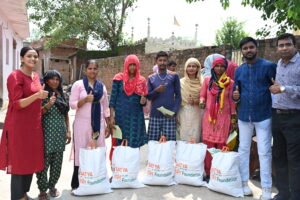- info@satyashaktifoundation.org
- Mon - Sat: 09.30 AM - 06:30 PM
Preserving Indigenous Knowledge: Empowering Rural Cultures

Introduction:
In the fast-paced, interconnected world of today, where technological advancements and globalization dominate, it’s crucial not to overlook the invaluable treasure trove of wisdom that indigenous communities hold. This communal and Indigenous knowledge, shaped by centuries of harmonious coexistence with nature, is a rich source of sustainable practices, cultural identity, and community resilience. Preserving this knowledge is not just an act of conservation; it’s a powerful means of empowering rural cultures and fostering a more sustainable and diverse global society.
Understanding Indigenous Knowledge:
Indigenous knowledge is a kind of generational collective wisdom passed down through ages within the native communities. It encompasses a wide array of skills, practices, and beliefs that are deeply rooted in the local environment. From agriculture and medicine to astronomy and storytelling, this knowledge is a holistic system that reflects the intricate relationship between indigenous people and their surroundings.
Sustainable Agriculture:
These Indigenous communities have developed sophisticated agricultural practices that are not only sustainable but also deeply rooted in ecological balance of the nature. Techniques such as crop rotation, agroforestry, and seed saving by these indigenous communities contribute to biodiversity and ensure food security. Preserving and integrating these practices can offer solutions to contemporary challenges like climate change and food scarcity.
Medicinal Wisdom:
Indigenous knowledge often includes a profound understanding of local medicinal plants and their applications. Many traditional healing methods have proven effective and are increasingly recognized by modern medicine. Preserving this knowledge not only provides alternative healthcare options but also contributes to the conservation of biodiversity by promoting the sustainable use of medicinal plants.
Cultural Identity and Language:
Indigenous knowledge is very closely & intricately tied to cultural identity and language of a particular place. As languages vanish, so does the unique perspective encapsulated in them. Preserving indigenous languages is essential for maintaining the knowledge encoded within them, ensuring the survival of traditional history, culture, rituals, and wisdom that form the bedrock of these communities.
Empowering Rural Cultures:
Community Resilience:
Indigenous knowledge fosters resilience within communities. The ability to adapt to changing environmental conditions and external pressures is a testament to the strength of indigenous cultures. By preserving and incorporating this knowledge into modern practices, rural communities can build resilience against the challenges of the 21st century.
Promoting Environmental Stewardship:
Indigenous knowledge is inherently tied to a deep love and respect for the environment. By integrating this wisdom into contemporary environmental practices, we can create a more sustainable and harmonious relationship with the natural world. Indigenous communities can lead the way in promoting eco-friendly solutions and fostering a sense of responsibility towards the planet. After all as it said that “Old is Gold”.
Cultural Exchange and Understanding:
Preserving indigenous knowledge is not just about safeguarding traditions; it’s also an opportunity for cultural exchange and understanding. By appreciating and incorporating indigenous wisdom, societies at large can benefit from diverse perspectives, fostering a global community that values and respects cultural diversity.
Conclusion:
Preserving indigenous knowledge is not a task solely for indigenous communities; it is a shared responsibility for humanity as a whole. Empowering the indigenous rural cultures by acknowledging, respecting, and integrating their knowledge into broader societal frameworks is a step towards a more sustainable, diverse, and interconnected world. As we move forward, let us recognize the profound impact of indigenous wisdom and strive to preserve it for the benefit of present and future generations.
Subscribe
Subscribe to our newsletter for the latest update.
Contact Us
- DPT 004, Ground Floor, DLF Prime Towers, Block- F, Okhla Phase-1, New Delhi- 110020 India
- +91-011 408 45450
- info@satyashaktifoundation.org
- Mon - Sat: 09.30 AM - 06:30 PM
-
© Copyright 2023 SATYA Shakti Foundation, All Rights Reserved. Developed By Kitoinfocom Pvt Ltd



Leave a Reply